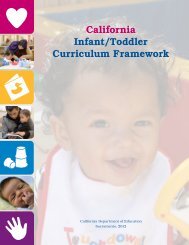Infant Toddler Learning & Development Foundations
Infant Toddler Learning & Development Foundations
Infant Toddler Learning & Development Foundations
You also want an ePaper? Increase the reach of your titles
YUMPU automatically turns print PDFs into web optimized ePapers that Google loves.
8 months<br />
Foundation: Social Understanding<br />
The developing understanding of the responses, communication,<br />
emotional expressions, and actions of other people<br />
At around eight months of<br />
age, children have learned<br />
what to expect from familiar<br />
people, understand what to<br />
do to get another’s attention,<br />
engage in back-and-forth<br />
interactions with others, and<br />
imitate the simple actions or<br />
facial expressions of others.<br />
For example, the child may:<br />
• Smile when the infant care<br />
teacher pauses, to get her to<br />
continue playing peek-a-boo or<br />
pat-a-cake.<br />
• Squeal in anticipation of the<br />
infant care teacher’s uncovering<br />
her eyes during a game of<br />
peek-a-boo.<br />
• Learn simple behaviors by imitating<br />
a parent’s facial expressions,<br />
gestures, or sounds.<br />
• Try to get a familiar game or<br />
routine started by prompting<br />
the infant care teacher.<br />
• Quiet crying upon realizing that<br />
the infant care teacher is approaching.<br />
Chart continues on next page.<br />
18 months<br />
At around 18 months of age,<br />
children know how to get the<br />
infant care teacher to respond in<br />
a specific way through gestures,<br />
vocalizations, and shared<br />
attention; use another’s emotional<br />
expressions to guide their<br />
own responses to unfamiliar<br />
events; and learn more complex<br />
behavior through imitation.<br />
Children also engage in more<br />
complex social interactions and<br />
have developed expectations<br />
for a greater number of familiar<br />
people.<br />
For example, the child may:<br />
• Gesture toward a desired toy<br />
or food while reaching, making<br />
imperative vocal sounds, and<br />
looking toward the infant care<br />
teacher.<br />
• Seek reassurance from the infant<br />
care teacher when unsure about<br />
something.<br />
• Vary response to different infant<br />
care teachers depending on their<br />
play styles, even before they have<br />
started playing; for example,<br />
get very excited upon seeing an<br />
infant care teacher who regularly<br />
plays in an exciting, vigorous<br />
manner.<br />
• Engage in back-and-forth play<br />
that involves turn-taking, such as<br />
rolling a ball back and forth.<br />
• Look in the direction of the infant<br />
care teacher’s gesturing or pointing.<br />
• Learn more complex behaviors<br />
through imitation, such as<br />
watching an older child put toys<br />
together and then doing it.<br />
36 months<br />
At around 36 months of<br />
age, children can talk about<br />
their own wants and feelings<br />
and those of other people,<br />
describe familiar routines,<br />
participate in coordinated<br />
episodes of pretend play<br />
with peers, and interact<br />
with adults in more complex<br />
ways.<br />
For example, the child may:<br />
33<br />
• Name own feelings or desires,<br />
explicitly contrast them with<br />
another’s, or describe why the<br />
child feels the way he does.<br />
• Describe what happens during<br />
the bedtime routine or another<br />
familiar everyday event.<br />
• Move into and out of pretend<br />
play roles, tell other children<br />
what they should do in their<br />
roles, or extend the sequence<br />
(such as by asking “Wanna<br />
drink?” after bringing a pretend<br />
hamburger to the table<br />
as a waiter).<br />
• Help the infant care teacher<br />
search for a missing toy.<br />
• Talk about what happened<br />
during a recent past experience,<br />
with the assistance of<br />
the infant care teacher.<br />
• Help the infant care teacher<br />
clean up at the end of the<br />
day by putting the toys in the<br />
usual places.<br />
SOCIAL-EMOTIONAL DEVELOPMENT
















